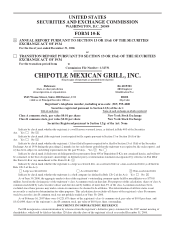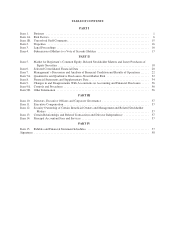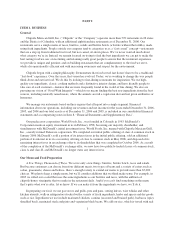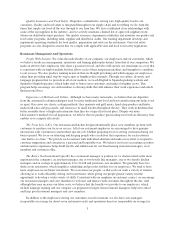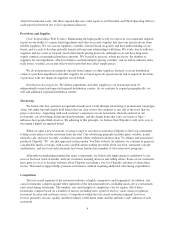Chipotle 2006 Annual Report Download - page 15
Download and view the complete annual report
Please find page 15 of the 2006 Chipotle annual report below. You can navigate through the pages in the report by either clicking on the pages listed below, or by using the keyword search tool below to find specific information within the annual report.Additional instances of e. coli, avian flu, “mad cow” disease or other food-borne illnesses could adversely
affect the price and availability of the meat or produce we use to prepare our food, cause the temporary
closure of some restaurants and result in negative publicity, thereby resulting in a decline in our sales.
In 2006, outbreaks of e. coli relating to certain food items caused consumers to avoid certain products and
restaurant chains. Asian and European countries have also experienced outbreaks of avian flu, and incidents of
“mad cow” disease have occurred in Canadian and U.S. cattle herds. These problems, other food-borne illnesses
(such as hepatitis A, trichinosis or salmonella) and injuries caused by food tampering have in the past, and could
in the future, adversely affect the price and availability of affected ingredients and cause customers to shift their
preferences, particularly if we choose to pass any higher ingredient costs along to consumers. As a result, our
sales may decline.
Instances of food-borne illnesses, real or perceived, whether at our restaurants or those of our competitors,
could also result in negative publicity about us or the restaurant industry, which could adversely affect sales. If
we react to negative publicity by changing our menu or other key aspects of the Chipotle experience, we may
lose customers who do not accept those changes, and may not be able to attract enough new customers to
produce the revenue needed to make our restaurants profitable. In addition, we may have different or additional
competitors for our intended customers as a result of making these changes and may not be able to compete
successfully against those competitors. If our customers become ill from food-borne illnesses, we could be forced
to temporarily close some restaurants. A decrease in customer traffic as a result of these health concerns or
negative publicity, or as a result of a change in our menu or dining experience or a temporary closure of any of
our restaurants, could materially harm our business.
We may face difficulties transitioning services McDonald’s provided to us and entering into new or
modified arrangements with existing or new suppliers or service providers.
We historically benefited from our relationship with McDonald’s. For example, McDonald’s provided us,
directly or through McDonald’s own vendor relationships, with accounting services, insurance policy coverage,
banking services, health and other insurance benefits for our employees, and employee benefit plans, as well as
with its expertise in certain areas of our operations such as real estate. We also benefited from our relationship
with McDonald’s when we bought supplies or distribution or other services. For example, McDonald’s
relationship with Coca-Cola helped us obtain beneficial beverage pricing, and we have relied on some of the
same third-party distribution networks as McDonald’s.
As a result of our separation from McDonald’s effective October 12, 2006, we are now responsible for
securing all of our own management, financial, tax, accounting, legal and other resources. In light of our
separation from McDonald’s and the resulting termination of services and benefits we received from them, we
have implemented or obtained accounting functions, information technology systems, employee benefits plans,
insurance policies and administrative services to replace services or benefits previously provided by McDonald’s.
We have limited experience providing or administering these services on our own and we may encounter
difficulties with some or all of these arrangements. We estimate the incremental costs of employee benefits,
insurance, information technology services and beverages due to our separation from McDonald’s to be between
$1.0 million and $2.0 million in 2007. However, we cannot quantify with certainty the total impact the separation
will have on our expenses. In addition, as a result of our separation from McDonald’s we may not receive the
volume pricing benefits or favorable service levels we received from suppliers, vendors and distribution centers
as a McDonald’s affiliate. We may also need to replace additional suppliers, vendors and distribution centers as a
result of our separation from McDonald’s, which could adversely affect our business.
Our insurance coverage and self-insurance reserves may not cover future claims.
We maintain various insurance policies for employee health, workers’ compensation, general liability and
property damage. In conjunction with our separation from McDonald’s, we entered into certain new insurance
9


